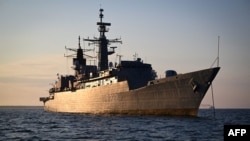Military leaders from several nations are quietly holding under-the-radar talks at the headquarters of the Turkish Navy in Ankara this week, focusing on Black Sea security in the event of a cease-fire between Russia and Ukraine.
The meetings come days after two European diplomatic sources told RFE/RL that Turkey had declared it was willing to "assume responsibility for the maritime dimension" of a multinational military deployment in Ukraine.
There are practical reasons for Turkey to do this.
The 1936 Montreux Convention places strict limits on the tonnage that non-littoral navies can deploy in the Black Sea and for how long. This makes Turkey, which has one of NATO's strongest militaries, the natural key player.
It has 17 frigates, for example, compared to just three in Romania's navy.
"It's impossible to solve this without Turkey on the side of the Europeans," Sam Greene of the Center for European Policy Analysis (CEPA) said at a recent briefing.
British and French vessels could also be expected to rotate through the Black Sea as part of a peacekeeping or reassurance force.
But as with the land-based force envisaged by the "coalition of the willing," the naval mission might also rely on a "US backstop."
How Is This Different?
According to the Center for Strategic and International Studies (CSIS), this would consist of air- and space-based intelligence, surveillance, and reconnaissance. Although, as the CSIS notes, US Navy ships regularly patrol the Black Sea anyway and could therefore also play a role.
In this regard, a Black Sea mission would take place under very different conditions to a land one -- in that NATO already has a well-established presence there with regular multinational exercises.
In fact, NATO just completed drills involving naval forces from 12 nations, including Turkey, the United States, Britain, and Romania. Over 12 days, forces simulated responses to hybrid, naval, and air attacks in the region.
Naval patrols would be focused on multiple missions, such as securing freedom of navigation for commercial shipping (including Ukraine's vital grain exports), monitoring cease-fire compliance, and mine clearance.
Andriy Ryzhenko, a reserve captain in the Ukrainian Navy, told RFE/RL's Current Time that "many ports are completely blocked at the moment," due to mines.
"They are Mykolayiv, Ochakiv, Kherson. Other ports are officially open but with limitations…. Mines need to be found and neutralized," he said.
'Ukraine Has Won'
Unlike on land, Ukraine feels it is winning or indeed has already won the war at sea.
A series of spectacular attacks that sank numerous Russian vessels has already pushed Russia's numerically superior navy out of its bases in occupied Crimea and back to Novorossiysk.
"Ukraine has won on the sea and now has a complete advantage. That is, it does not allow the enemy near its coasts and it ensures civilian navigation," Oleksiy Neizhpapa, head of the Ukrainian Navy, told RFE/RL's Ukrainian Service on April 8.
"But the enemy has the ability, has weapons that can hit civilian objects, civilian ships directly in ports or at sea. So, of course, the danger remains."
This was amply demonstrated by overnight Russian drone attacks on Odesa on April 16.
Ryzhenko also pointed out that shipping in the Black Sea is not operating along peacetime routes and that these need to be restored.
"It needs to be possible to go directly from Odesa to the Bosphorus across the middle of the Black Sea and not hiding in the territorial waters of neighboring countries," he said.
Ryzhenko added that the talks in Ankara would be focused on these details.
Low-Profile Talks
The talks were first announced by the Turkish Defense Ministry on April 13, but officials would not reveal which countries were taking part.
Later, it was reported that NATO members Bulgaria and Romania would be involved, along with Georgia.
On April 15, Britain's Defense Ministry told RFE/RL that it would join the meetings, before Ukrainian President Volodymyr Zelenskyy revealed that Ukraine and France were also attending.
"We are talking about the presence of a contingent at sea, and we believe that Turkey can have a serious place in future security guarantees for the sea," Zelenskyy said.
"This is not about ending the war, this is about what will happen after the cease-fire -- security guarantees," he added.
As with previous discussions on a land-based contingent, the United States is not involved in the talks.


















